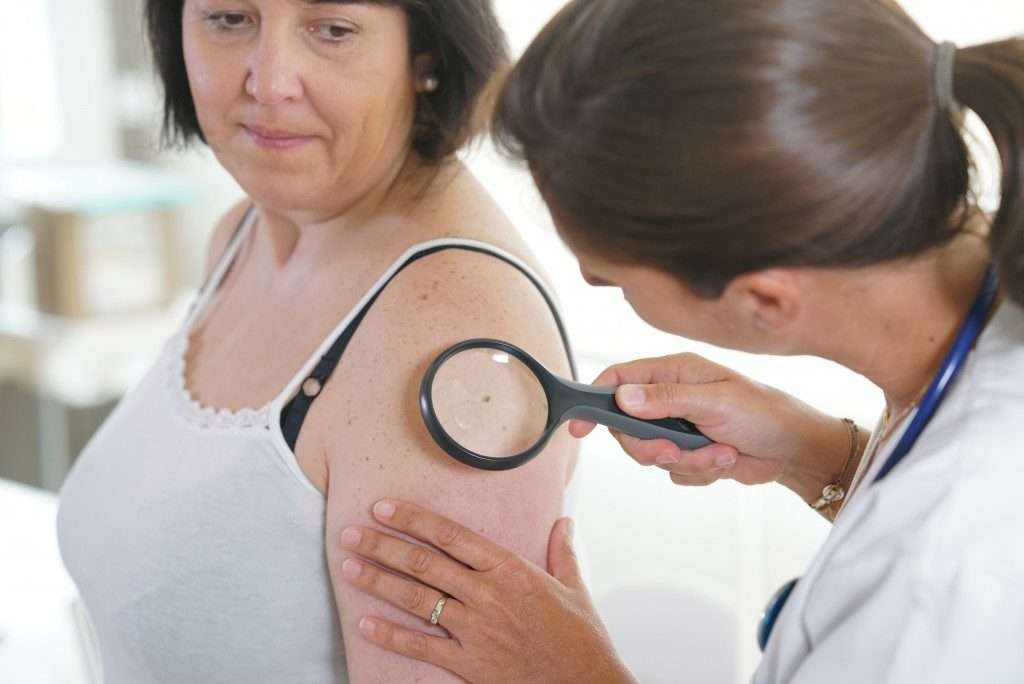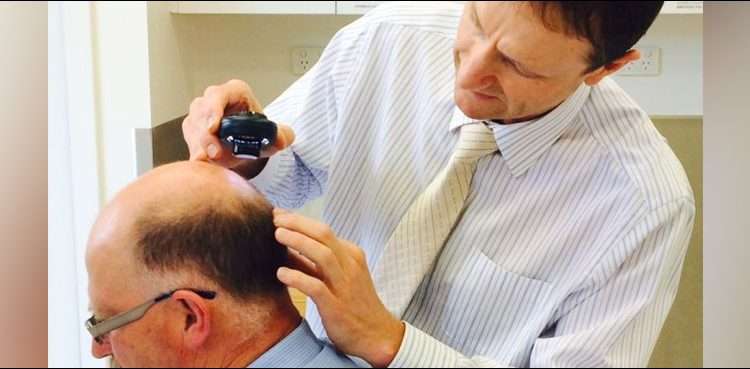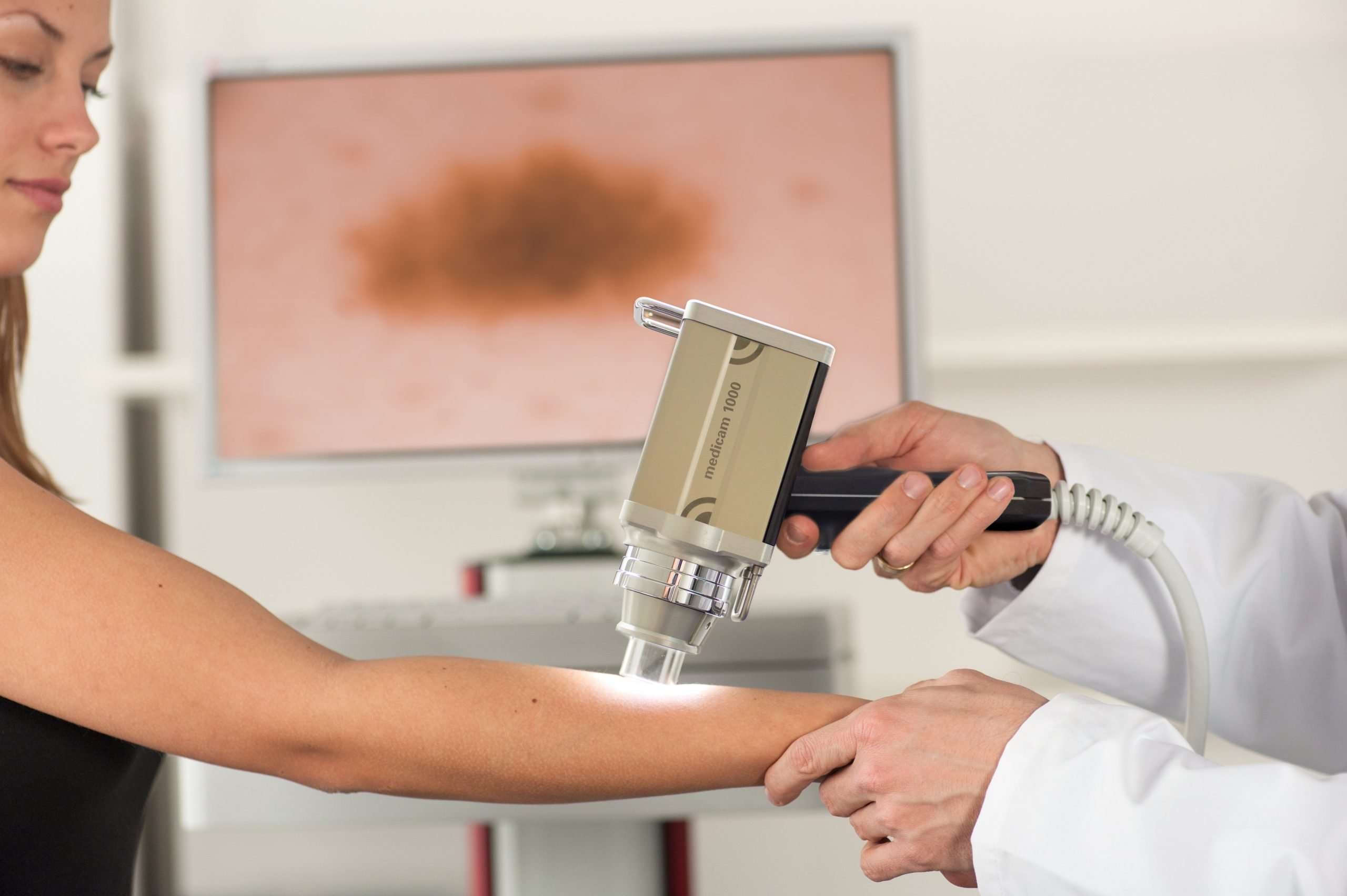What Is A Pathologists Role In Treating Skin Cancer
You may never meet your pathologist. This doctor specializes in examining tissue samples or body fluids. Pathology is needed to make a definite diagnosis of cancer. A dermatopathologist is an expert in the microscopic diagnosis of skin disease.3
When your doctor biopsies a lesion, the tissue sample is sent to a laboratory. A pathologist will look at it under a microscope to see whether the sample contains abnormal cells. Additional tests may be done to check for genetic mutations and chromosomal abnormalities. The pathologist will write a report that describes the sample. This information is essential for diagnosing skin cancer. It is also is important for determining the cancer stage.
The Warning Signs Of Skin Cancer
Skin cancers — including melanoma, basal cell carcinoma, and squamous cell carcinoma — often start as changes to your skin. They can be new growths or precancerous lesions — changes that are not cancer but could become cancer over time. An estimated 40% to 50% of fair-skinned people who live to be 65 will develop at least one skin cancer. Learn to spot the early warning signs. Skin cancer can be cured if it’s found and treated early.
Different Kinds Of Skin Cancer
There are many types of skin cancer. Some are very rare. Your doctor can tell you more about the type you have.
The two most common kinds of skin cancers are:
- Basal cell cancer, which starts in the lowest layer of the skin
- Squamous cell cancer, which starts in the top layer of the skin
Another kind of skin cancer is called melanoma. These cancers start from the color-making cells of the skin . You can read about melanoma in If You Have Melanoma Skin Cancer.
Don’t Miss: How Do You Treat Melanoma Cancer
You Can Maintain Healthy Skin Both During And After Skin Cancer Therapy
Skin cancer treatments can be quite harsh, causing changes to the skin that increase dryness, irritation, scarring and sensitivity. The good news is that todays skincare market is quite advanced, offering a variety of products which can help the skin heal more quickly. We cannot stress enough the importance of speaking with your doctor, or even dermatologist, about ways in which you can keep your skin healthy throughout your treatment, as well as after your treatment is completed.
What Are The Symptoms Of Skin Cancer

Most skin cancers can be cured if diagnosed and treated early. Aside from protecting your skin from sun damage, it is important to recognize the early signs of skin cancer.
The ABCDEs of melanoma are a helpful guide: Asymmetry Borders Color Diameter Evolution. The symptoms of melanoma skin cancer include:
- Moles that are different on one side
- Irregular borders of a mole
- Color variation including shades of brown and black, which could be concerning
- Diameter or the sizeif the mole is larger than 6 mm, a doctor should evaluate it
- Moles or lesions that are different than the rest, or change in size, shape, or color over time are concerning
Symptoms of non-melanoma skin cancer include:
- Itchy patches of skin that may crust over or are very painful
- Bumps or skin spots that bleed easily or crust over frequently
- Nodules that do not go away. These may be clear, a pearl-like color, or even red, pink, or white.
- Skin sores that do not heal
- A scar-like bump that was not caused by injury or trauma
css id:
Recommended Reading: What Do Skin Cancer Marks Look Like
What Causes Cancer To Form On Your Scalp
The main cause of all types of skin cancer is sun exposure. Your scalp is one of your body parts exposed most to the sun, especially if you are bald or have thin hair. That means its one of the more common spots for skin cancer.
Other potential causes of skin cancer on your scalp include using a tanning bed and having had radiation treatment on your head or neck area.
The best way to prevent skin cancer on your scalp is to protect your scalp when you go into the sun:
- Wear a hat or other head covering whenever possible.
- Spray sunscreen on your scalp.
Other ways to help prevent skin cancer on your scalp are:
- Avoid using tanning beds.
- Limit your time in the sun.
- Check your scalp regularly to spot any potential cancerous spots early. This can help stop precancerous lesions from turning into cancer or stop skin cancer from spreading. You can use a mirror to look at the back and top of your scalp more thoroughly.
Considering Complementary And Alternative Methods
You may hear about alternative or complementary methods that your doctor hasnt mentioned to treat your cancer or relieve symptoms. These methods can include vitamins, herbs, and special diets, or other methods such as acupuncture or massage, to name a few.
Complementary methods refer to treatments that are used along with your regular medical care. Alternative treatments are used instead of a doctors medical treatment. Although some of these methods might be helpful in relieving symptoms or helping you feel better, many have not been proven to work. Some might even be harmful.
Be sure to talk to your cancer care team about any method you are thinking about using. They can help you learn what is known about the method, which can help you make an informed decision.
Also Check: How Dangerous Is Melanoma Skin Cancer
You’ve Been Diagnosed With Skin Cancer Now What
Any type of cancer diagnosis can be very concerning and the course of treatment for it varies by type. With skin cancer, there are quite a few types that make the type of treatment vary.
You may have received a diagnosis after an exam by your primary care doctor or a dermatologist. The next step would be choosing a skin cancer specialist also called an oncologistfor your skin cancer treatment plan.
First, youll learn more about the type of skin cancer you have: melanoma or nonmelanoma. You will also learn more about how far the cancer has spread or how deep it goes into your skin. Much of this information comes from the biopsy that was performed to determine the type of skin cancer it is.
How Is Cancer On The Scalp Treated
Potential treatments for skin cancer on your scalp include:
- Surgery. Your doctor will remove the cancerous growth and some of the skin around it, to make sure that they removed all the cancer cells. This is usually the first treatment for melanoma. After surgery, you may also need reconstructive surgery, such as a skin graft.
- Mohs surgery. This type of surgery is used for large, recurring, or hard-to-treat skin cancer. Its used to save as much skin as possible. In Mohs surgery, your doctor will remove the growth layer by layer, examining each one under a microscope, until there are no cancer cells left.
- Radiation. This may be used as a first treatment or after surgery, to kill remaining cancer cells.
- Chemotherapy. If your skin cancer is only on the top layer of skin, you might be able to use a chemotherapy lotion to treat it. If your cancer has spread, you might need traditional chemotherapy.
- Freezing. Used for cancer that doesnt go deep into your skin.
- . Youll take medications that will make cancer cells sensitive to light. Then your doctor will use lasers to kill the cells.
The outlook for skin cancer on your scalp depends on the specific type of skin cancer:
Also Check: What Is Invasive Carcinoma Breast Cancer
You Can Find Skin Cancer On Your Body
The best way to find skin cancer is to examine yourself. When checking, you want to look at the spots on your skin. And you want to check everywhere from your scalp to the spaces between your toes and the bottoms of your feet.
If possible, having a partner can be helpful. Your partner can examine hard-to-see areas like your scalp and back.
Getting in the habit of checking your skin will help you notice changes. Checking monthly can be beneficial. If you have had skin cancer, your dermatologist can tell you how often you should check your skin.
People of all ages get skin cancer
Checking your skin can help you find skin cancer early when its highly treatable.
What The Doctor Is Looking For
During a skin cancer screening, your doctor is checking for the ABCDEs of each mole, which are all possible signs of skin cancer:
- Asymmetry: Not the same shape on both sides
- Border irregularity: Ragged or blurred edges
- Color: Different shades of tan, brown, or black
- Diameter: Larger than 1/4 inch
- Evolving: Changes over time
Your doctor will also check for actinic keratosis, skin changes caused by sun damage that, without treatment, can turn into cancer.
Read Also: Does Basal Cell Carcinoma Make You Tired
Questions To Ask Your Doctor
You may have many questions about treatment options for skin cancer and melanoma. Getting answers from your doctor may help you make more informed decisions about your treatment plan. Below are some important questions skin cancer patients should ask their doctors:
What does it mean that my cancer has metastasized?
Metastasis occurs when cancer cells break off from the primary tumor, spread elsewhere and establish new tumors in other parts of the body. Basal cell carcinomas and squamous cell carcinomas, which account for more than 95 percent of all skin cancers, rarely metastasize. Melanoma, however, is among several cancers that may travel, or metastasize, to other parts of the body. In most cases, metastatic melanoma spreads to the brain, lungs, bones and/or lymph nodes. Metastatic skin cancer may require extensive surgery, chemotherapy and other treatments. You may also consider talking to your doctor about therapies that may help you manage symptoms and side effects. Metastatic cancer is different than recurrent cancer, which is cancer that returns to the same part of the body.
Is immunotherapy an option for me?
Should I participate in a clinical trial?
What Happens During A Skin Cancer Full Body Exam

The screening usually takes 10 minutes, or longer if the doctor sees any moles that look unusual. Youll take off all of your clothes and put on a medical exam gown. Your doctor will ask if you have any moles that concern you. Then, they will then look at every inch of your body — from your face, chest, arms, back, and legs to less-visible places like your scalp, between your toes, and the soles of your feet.
Also Check: What Are The Symptoms Of Renal Cell Carcinoma
Thinking About Taking Part In A Clinical Trial
Clinical trials are carefully controlled research studies that are done to get a closer look at promising new treatments or procedures. Clinical trials are one way to get state-of-the art cancer treatment. In some cases they may be the only way to get access to newer treatments. They are also the best way for doctors to learn better methods to treat cancer. Still, they’re not right for everyone.
If you would like to learn more about clinical trials that might be right for you, start by asking your doctor if your clinic or hospital conducts clinical trials.
Consider Getting A Second Opinion On Pathology
The first step in diagnosing skin cancer is a skin biopsy. The tissue sample taken during the biopsy is sent to a pathologist, who then examines the cells under a microscope. Pathologists are usually certain about their diagnoses. But there are instances when the cancer cells look unusual or the pathology is inconclusive for some other reason.
How do you know if you need a second opinion if no one has told you to get one? Start by asking your doctor, says Dr. Lee. One way you might phrase the question is, Was the pathology definitive? If the doctor says no, thats your cue to seek out a second opinion on your pathology.
You can also review the pathology report yourself. Sometimes the report will say the diagnosis is inconclusive. Also be on the lookout for phrases such as most in keeping with or features of, says Dr. Lee. This is terminology indicating that the pathologist formed a hypothesis but wasnt absolutely certain.
One of the benefits of coming to MSK for care is that we review the pathology, says Dr. Lee. Most of the time we confirm the original diagnosis, but occasionally we do see differences.
You May Like: What Is Squamous Cell Carcinoma Keratoacanthoma Type
A Primer On Skin Cancer
Malignant melanoma, especially in the later stages, is serious and treatment is difficult. Early diagnosis and treatment can increase the survival rate. Nonmelanoma skin cancers include basal cell carcinoma and squamous cell carcinoma. Both are common and are almost always cured when found early and treated. People who’ve had skin cancer once are at risk for getting it again they should get a checkup at least once a year.
How To Choose The Best Healthcare Team
Your primary care doctor or dermatologist can refer you to specialists and help you assemble a strong healthcare team.
Its important to research each experts credentials. For example, you might want to confirm that the professionals you see dont have a history of malpractice claims or disciplinary actions. Also, consider the doctors experience with treating your type of cancer.
Board certification is another factor to take into account. If doctors are board-certified, it means they have the training, skills, and experience to practice in their specific field.
You can also find out where the expert attended medical school and underwent training. Websites like Healthgrades provide this type of information.
Recommended Reading: How Do You Test For Melanoma
How Often Should You Get A Skin Cancer Exam
Experts disagree on this question. Some medical groups say you should only get a screening if you have suspicious moles or you have a high chance of getting melanoma, the deadliest type of skin cancer.
Others recommend a yearly screening for people who are at high risk for skin cancer. A few things make you more likely to get it:
- Blond or red hair, light eye color, and skin that freckles or sunburns easily
- People in your family have had melanoma
- Youve had unusual moles in the past
- Youve had sunburns before, especially any that blistered
- Youve used tanning beds
- You have more than 50 moles or any that look irregular
How Does The Doctor Know I Have Skin Cancer
Basal and squamous skin cancer may look like:
- Flat, firm, pale or yellow areas that look a lot like a scar
- Raised reddish patches that might itch
- Rough or scaly red patches, which might crust or bleed
- Small, pink or red, shiny, pearly bumps, which might have blue, brown, or black areas
- Pink growths or lumps with raised edges and a lower center
- Open sores that dont heal, or that heal and then come back
- Wart-like growths
Read Also: Can You Get Skin Cancer On Your Breast
Questions About Skin Cancer Risk Factors And Prevention
How can I reduce my risk of getting skin cancer?
Exposure to UV radiation is the primary cause of cell damage that may lead to skin cancer. One important way to reduce your risk of skin cancer is to avoid sun exposure when possible and/or protect yourself from damaging rays. Consider following these tips:
What is ultraviolet radiation?
UV radiation is among several types of light emitted by the sun. It’s also a carcinogen. Most of the UV light that reaches the earth is UVA, the long-wave ultraviolet rays that penetrate the skin more deeply than UVB rays. These strong rays can reach the skins deepest layers, where melanocytes are located. Melanocytes absorb UVA, producing the pigment melanin, which darkens the skin. But too much UVA may damage melanocytes, potentially causing melanoma. UVB rays are not nearly as prevalent or potent, but they may burn the outer layers of skin.
How do I examine myself for skin cancer?
Skin Cancer Diagnosis Always Requires A Skin Biopsy

When you see a dermatologist because youve found a spot that might be skin cancer, your dermatologist will examine the spot.
If the spot looks like it could be a skin cancer, your dermatologist will remove it all or part of it. This can easily be done during your appointment. The procedure that your dermatologist uses to remove the spot is called a skin biopsy.
Having a skin biopsy is essential. Its the only way to know whether you have skin cancer. Theres no other way to know for sure.
What your dermatologist removes will be looked at under a microscope. The doctor who examines the removed skin will look for cancer cells. If cancer cells are found, your biopsy report will tell you what type of skin cancer cells were found. When cancer cells arent found, your biopsy report will explain what was seen under the microscope.
Also Check: Can Merkel Cell Carcinoma Be Cured
What About Other Treatments That I Hear About
When you have cancer you might hear about other ways to treat the cancer or treat your symptoms. These may not always be standard medical treatments. These treatments may be vitamins, herbs, special diets, and other things. You may wonder about these treatments.
Some of these are known to help, but many have not been tested. Some have been shown not to help. A few have even been found to be harmful. Talk to your doctor about anything youre thinking about using, whether its a vitamin, a diet, or anything else.